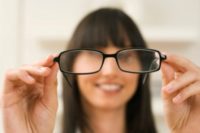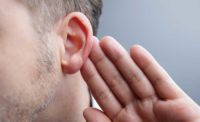More than 20 million Americans suffer from severe vision loss. While not all eye diseases can be prevented, there are simple steps that everyone can take to help their eyes remain healthy now and reduce their chances of vision loss in the future.
• Sunglasses prevent retinal damage; they also protect the delicate eyelid skin to prevent both wrinkles and skin cancer around the eye, and both cancerous and non-cancerous growths on the eye.
• Tobacco smoking is directly linked to age-related macular degeneration (AMD). Studies show that current smokers and ex-smokers are more likely to develop AMD than people who have never smoked. Smokers are also at increased risk for developing cataracts.
• Vitamin deficiency can impair retinal function. Researchers have found people on diets with higher levels of vitamins C and E, zinc, lutein, zeaxanthin, omega-3 fatty acids DHA and EPA are less likely to develop early and advanced AMD.
• Adults with no signs or risk factors for eye disease should get a baseline eye disease screening at age 40 — the time when early signs of disease and changes in vision may start to occur. Based on the results of the initial screening, an ophthalmologist will prescribe the necessary intervals for follow-up exams. Anyone with symptoms or a family history of eye disease, diabetes or high blood pressure should see an ophthalmologist to determine how frequently your eyes should be examined.
• An estimated 2.5 million eye injuries occur in the U.S. each year, so it is critical to wear proper eye protection to prevent eye injuries at work, playing sports, and DIY projects around the house.
• Most serious eye conditions, such as glaucoma and AMD, are more easily and successfully treated if diagnosed and treated early. Left untreated, these diseases can cause serious vision loss and blindness. Early intervention now will prevent vision loss later.
• When you go to get your eyes checked, there are a variety of eye care providers you might see. Ophthalmologists, optometrists and opticians all play an important role in providing eye care services to consumers. However, each has a different level of training and expertise. Make sure you are seeing the right provider for your condition or treatment. Ophthalmologists are specially trained to provide the full spectrum of eye care, from prescribing glasses and contact lenses to complex and delicate eye surgery.
• Follow your Eye M.D.'s instructions regarding the care and use of contact lenses. Abuse, such as sleeping in contacts that are not approved for overnight wear, using saliva or water as a wetting solution, using expired solutions, and using disposable contact lenses beyond their wear can result in corneal ulcers, severe pain and even vision loss.
• If you have eye strain from working at a computer or doing close work, you can follow that 20-20-20 rule. If eye fatigue persists, it can be a sign of several different conditions, such as dry eye, presbyopia, or spectacles with lenses that are not properly centered. See an Eye M.D. to determine why you are having eye fatigue and to receive proper treatment.
Source: American Academy of Ophthalmology







